

The IEP team is a group of people, knowledgeable about the child, who come together at an IEP meeting to develop or review and revise a child's IEP. Collaboration among IEP team members is essential to ensure that each child’s educational experience is appropriate and meaningful. All members of the IEP team are equal partners in IEP discussions. Because of their long-term perspective and unique relationship, parents bring a valuable understanding of their child to the table. Children also can express their own needs, strengths, and interests. Educators, on the other hand, bring an educational focus to the meeting; an understanding of the curriculum, the challenging educational standards for the child, and the relationship to the general education environment. With this in mind, parents and educators must continue to recognize their responsibility to maintain and enhance partnerships with each other and the child throughout the school year in order to create a collaborative environment at each IEP team meeting.
Student
The student must be invited to attend his or her own IEP meeting beginning at age 13, or younger, if a purpose of the meeting is consideration of the student’s postsecondary goals and the transition services needed to assist the student in reaching those goals. If the student elects not to participate, the IEP team must take other steps to ensure that the student's preferences and interests are considered in developing the IEP (34 CFR § 300.321(b)(2)). The LEA may invite the student to attend his or her own IEP team meeting at any age, when appropriate. Beginning at age 18, unless the student has been determined incompetent by a court, the rights have transferred to the student, and both the student and parents must receive written notice of the IEP team meeting.
Parents (REQUIRED)
The parents must be members of the IEP team. The parents are equal partners and play an active role in providing critical information about their child's abilities, interests, performance, and history. They are involved in the decision-making process throughout the development of the IEP.
Other Service Providers (REQUIRED, if applicable)
Other service providers may include:
Speech-language pathologists/speech therapists
Occupational Therapists
Physical Therapists
General Education Teacher (REQUIRED)
The team must also include not less than one general education teacher of the child, if the child is, or may be, participating in the general education environment. This must be a teacher who is or may be working with the child to ensure success in the general curriculum and implement portions of the IEP. The general education teacher is knowledgeable about the curriculum, appropriate activities of typically developing peers, and how the child’s disability affects the child’s participation (involvement and progress) in the curriculum or those appropriate activities. General education teachers assist in the development, review, and revision of the IEP including determining appropriate positive behavioral interventions and supports and other strategies for the child, as well as supplementary aids and services, program modifications and supports to enable general education teachers to work with the child.
LEA (REQUIRED)
The LEA or designee must be a member of the IEP team. There are three requirements of the LEA representative or designee. The LEA representative or designee:
Other
Other team members may be added, based on the child’s individual needs. Other team members may include:
School psychologist
Representatives for other agencies (For a child with a disability age 13 or older the IEP team will consider the transition services of the child, and the IEP team must determine, to the extent appropriate, any other public agency representatives that must be invited to the IEP meeting because they are likely to be responsible for providing or paying for transition services. The parents, or a student who is 18 years of age, must provide consent prior to each IEP Team meeting if a public agency proposes to invite a representative of any participating agency that is likely to be responsible for providing or paying for transition services. (34 CFR § 300.321(b)(3). This written consent is obtained on the Parental Permission to Exchange Information with Agencies Participating in Transition Services form.)
Other individuals who have knowledge or special expertise regarding the child (Although parents are not required to do so, the LEA may ask the parents to inform them of the individuals they are bringing.)
In Enrich IEP, the first step within the IEP process is the IEP team set up. The Parent/Guardian information is imported from PowerSchool; if there are errors in this information, the Power School Clerk should be notified, rather than changes being made in Enrich IEP by the user. Users should NOT delete Parent/Guardian information from the EasyIEP system.
From the students’ Programs tab, click on “Add Team Members” or “Manage Team” to add team members. You will add anyone who has a login and access to Enrich IEP through this process.




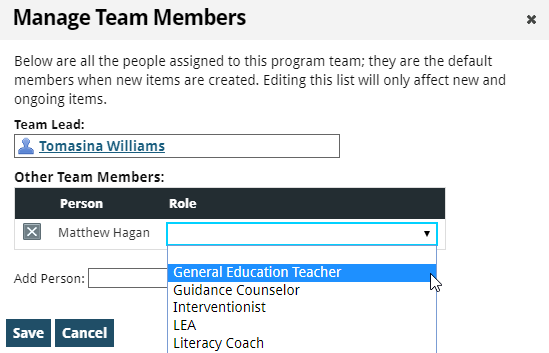
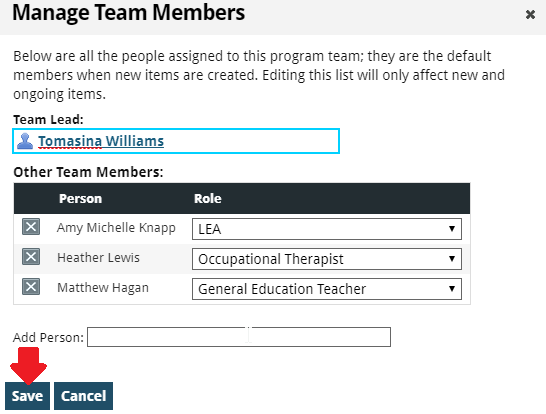
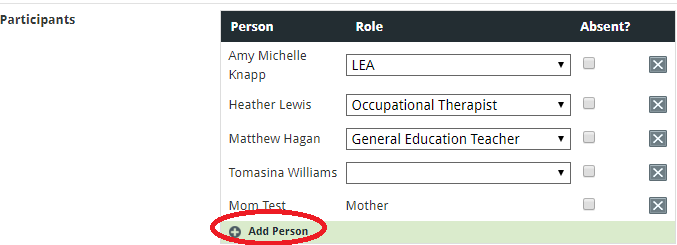
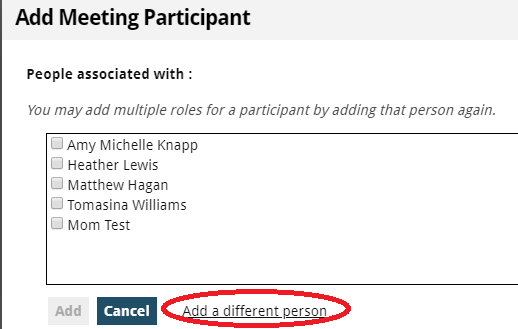
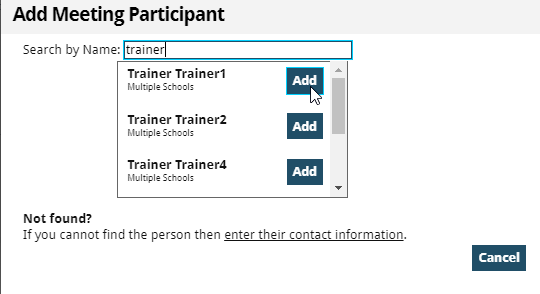
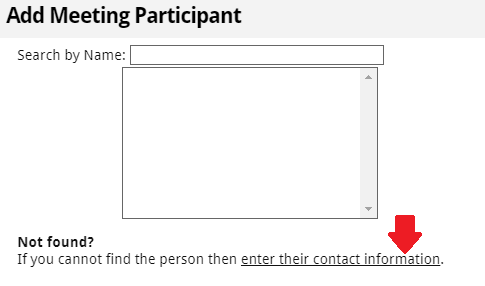
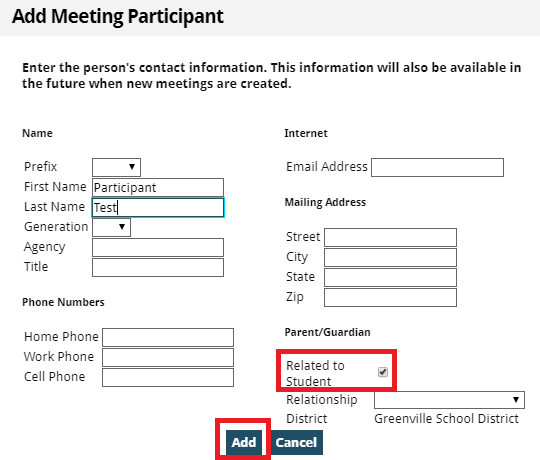
To continue to the next step in the IEP Process: IEP Team Attendance and Excusals, click Next below.
IEP Process IEP Team and Parent Guardian Information